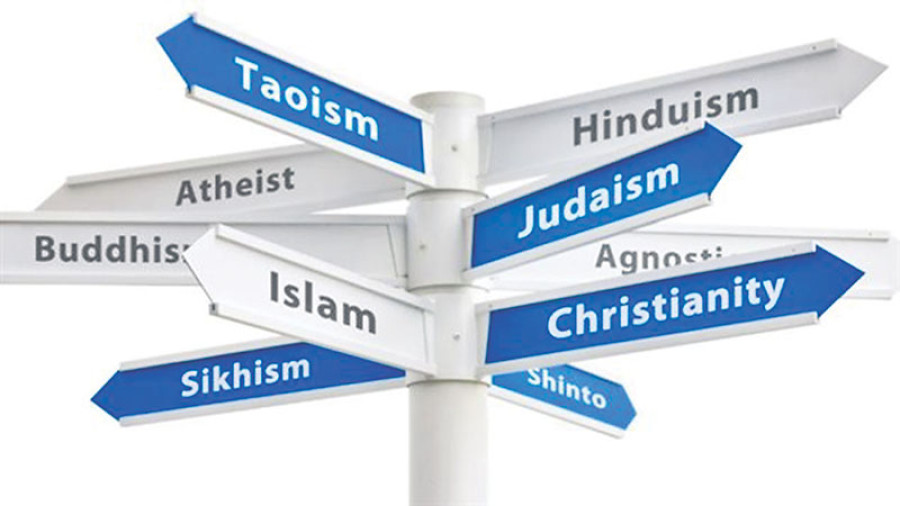Opinion
Not so black and white
What religion an individual follows merely has any relationship with their economic development
Jagannath Adhikari
Sambridhi has become a common parlance in Nepal recently. In the meantime, there have also been debates as to why Nepal is not on the path of sambridhi—progress, development or modernisation. We recently witnessed a debate in media on the role of Hindu religious values on development. This debate was triggered after the former prime minister Baburam Bhattarai commented that Hindu religious belief in the afterlife is constraining sambridhi.
He argued that unless one cannot experience the benefit of development in this life, she/he will have no incentive to work for progress. A wide range of opinions—from an extreme view that this commentary is anti-Hindu to the opinion that Hindu worldview is conducive to development—were expressed thereafter. This is reminiscent of the time when there were also such debates after Dor Bahdur Bista published his book Fatalism and development: Nepal’s struggle for modernization.
An old debate
As a matter of fact, this debate on religious beliefs and progress is very old; it became prominent after Max Weber discussed in his book (1905) Protestant ethics and the spirit of capitalism about how an ideology of work-ethics followed by Protestants helped them to succeed in business and industry as compared to Catholics. Weber also wrote on Hindu and Buddhist religions in the context of India and argued that these religions lacked rationalisation that would help usher modern development. Furthermore, he mentioned that spirituality is favoured over materialism in India (i.e., in the context of Hindu and Buddhist religions), which stunted economic development and prevented people from undertaking economic enterprises.
Max Weber’s idea on religion and development became popular as it provided an alternative framework to understand development of capitalism. In case of Hindu religion, as a person’s social and economic status is also believed to be gained from actions in previous life, it is argued that people would not work for the ‘achieved’ status. For many others, this frame of argument was useful to sanitise colonialism from its impact on economic problem in India.
Scholars also argue that Hinduism as a religious ideology has nothing to do with development or modernisation. They take the view that until the 13th century, India was one of the richest countries in the world. In his book Why I am a Hindu, Shashi Tharoor writes that before British colonialism, India contributed to almost 21 percent of world’s GDP. Even Gunder Frank, the proponent of dependency theory, argued in his book Global economy in Asian age that China and India were economically the most powerful countries until the 16th Century. These were/are the countries where Hindu and Buddhist religions were prominent—the same religions now thought as the reasons for backwardness and lack of progress.
Many of the Indian and Nepali diasporas working in developed countries maintain deep religious faith in Hinduism and Buddhism, but they are making good economic progress nonetheless. Buddhism is followed in China too, but it has demonstrated commendable economic prowess. Japan is another example where people adhere to Buddhist religion, but it is able to develop economically and technologically keeping its traditions intact.
This clearly indicates that it is not the religious ideology of the individuals but the suitable political environment that is essential for economic development. But, of course, there are social issues like caste discrimination that constraint some individual’s initiatives.
Diverse views within religions:
There is also an argument that, like all other religions, some branches of Hindu religion,or some ideas, may be more conducive than others when it comes to economic enterprises as their focus is different. Hindu religion is quite diverse. Historians argue that a concept of monolithic unity was imposed upon Hindu religion while comparing it with other religions and, in this pursuit, only Brahmanical tradition was taken into account and considered as Hindu religion. This concept of supposedly monolithic unity in Hindu religion has overshadowed its fluidity, which has become a political problem these days. As Brahmanical tradition is seen keen on status and rigid on change, it is considered to pose obstacle for modern progress. This idea also resonates through Dor Bahadur Bista’s book Fatalism and development, which argues that Brahmanism is riddled with fatalism. Such works do not take into account that many dominant Hindu ideologies as such do not shun economic progress. For example, Hindu ideologies also stresses on gaining artha—material wealth in one’s life as one of the achievements as in Western materialist ideology. But, according to Hindu religion, there are other achievements—both material and spiritual—to be achieved.
Hindu religion also believes in the concept of dharma—doing one’s duty according to one’s responsibility. This is seen to propel people towards ethical material progress. But, for this concept to work, there should be right political and business environment. This implies that there is no progress because responsible people do not adhere to their dharma and create conducive environment, but not because of Hindu religious ideology.
Adhikari is a researcher




 9.89°C Kathmandu
9.89°C Kathmandu










